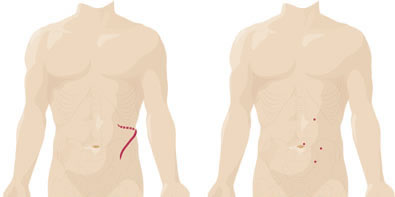Adrenal Conditions
The adrenal glands are the star-shaped endocrine glands that sit on top of the kidneys. They chiefly are responsible for regulating the stress response through the synthesis of hormones such as epinephrine, norepinephrine, androgens, estrogens, aldosterone, and cortisol.
Most adrenal conditions are benign and controllable through medication. Sometimes tumors may form on the adrenal glands. In most cases, these tumors are benign. Adrenal cancer, though extremely rare, also is possible. Both benign and malignant tumors can cause overproduction of adrenal hormones.
Causes of adrenal conditions often are unknown, but could include Cushing's syndrome, hypothalamic disorders, pituitary gland disorders, and certain hereditary diseases. Often, the main symptoms of adrenal disorders are hormone-related.
Treatment for Adrenal Conditions
Non-cancerous adrenal conditions that do not include a tumor usually can be treated with medication or other forms of therapy.
Adrenalectomy
When an adrenal tumor is involved, malignant or benign, surgical removal of one or both of the adrenal glands usually is advised. This is called adrenalectomy. A successful procedure will aid in correcting hormone imbalances, and may also remove cancerous tumors that can invade other parts of the body. Occasionally, adrenalectomy may be recommended when hormones produced by the adrenal glands aggravate another condition such as breast cancer.
Adrenalectomy usually is performed through conventional open surgery, but in selected patients surgeons may use laparoscopy. With laparoscopy, adrenalectomy can be accomplished through four very small incisions. Though less invasive, laparoscopy limits the doctor’s dexterity, visualization and control when compared to open surgery.
Robotic-Assisted Adrenalectomy: A Less Invasive Option
 Robotic-assisted adrenalectomy is a less invasive and potentially more effective alternative to laparoscopic and open adrenal gland surgery.
Robotic-assisted adrenalectomy is a less invasive and potentially more effective alternative to laparoscopic and open adrenal gland surgery.
When performed robotically with the da Vinci Surgical System, adrenalectomy is done with unparalleled precision and control through a few small incisions along the abdomen. It offers numerous potential benefits over other surgical methods, including:
- Significantly less pain
- Less blood loss
- Fewer transfusions
- Less risk of infection
- Less scarring
- Shorter hospital stay
- Shorter recovery time
- Better clinical outcomes, in many cases
As with any surgery, these benefits cannot be guaranteed, as surgery is both patient- and procedure-specific. While robotic-assisted adrenalectomy is considered safe and effective, it may not be appropriate for every individual. Always ask your doctor about all treatment options, as well as their risks and benefits.
Illustrations courtesy of Intuitive Surgical, Inc.